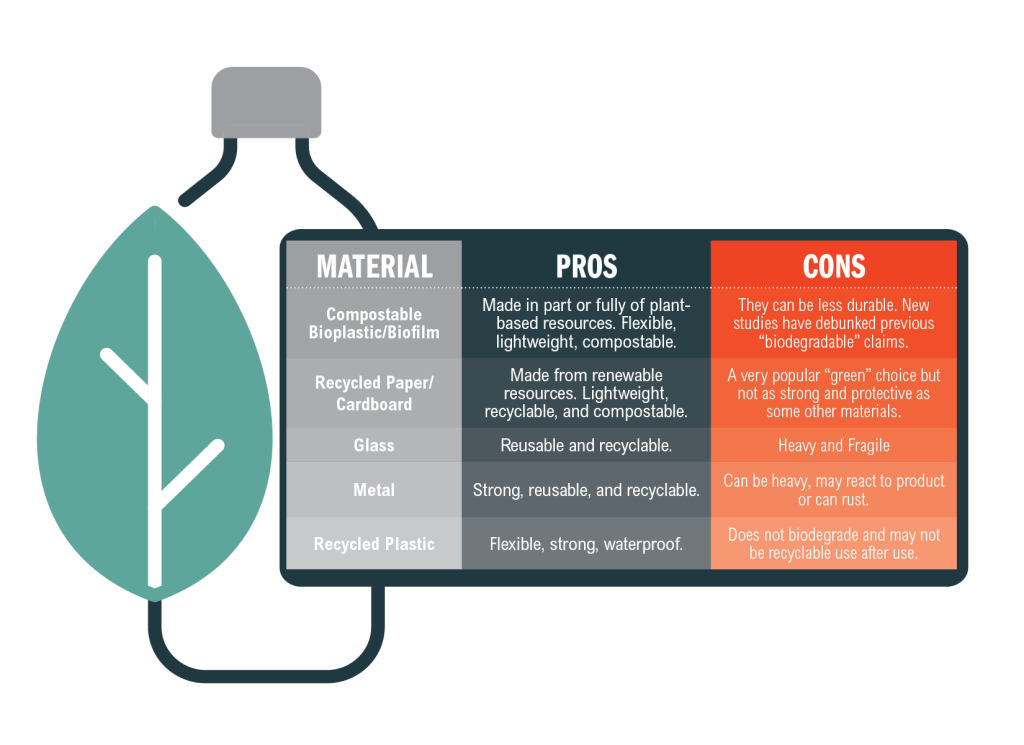HUMANIZE AND STRENGTHEN YOUR BRAND WITH EMPHASIS ON SUSTAINABLE PACKAGING
Connect to a conscious consumer with packaging that echoes the concerns you share with your audience. According to a survey from McKinsey & Co. 66% of all respondents and 75% of millennial respondents say that they consider sustainability when they make a purchase.

HOW IMPORTANT IS IT?
Sustainable packaging is an environmental, social and governance related claim (ESG). It shows that consumers are thinking about and spending more on brands that share their concerns. A sustainable package represents a doorway to showcasing your purpose as a brand. Your packaging is designed to communicate your brand message. The impact of the materials, and usefulness of that packaging are the unspoken elements of your brand’s perception.
STRIVING TOWARD A CIRCULAR ECONOMY
Bachman Brand Development, tries to direct our clients toward eliminating waste while contributing to a circular economy. Not only for planet saving but also cost savings. A circular economy introduces fewer natural resources while recycling and reusing the materials that are already in circulation. This creates less waste while increasing self-reliance. Our clients have already zeroed-in on more sustainable design practices by rethinking their entire process. From product design through manufacturing and distribution, almost all waste is seen as a design flaw. Clients approach Bachman Brand Development seeking insight and guidance into exploring sustainable packaging options to introduce into their brand messaging.
DESIGNING A SUSTAINABLE PACKAGE
Packaging is the window into the brand’s soul. Also, it is a great means for reducing the carbon footprint of the brand and the end user. It is arguably the most impactful area where form and function meet. Sustainable packaging has transcended from a “nice to have’ into a “must have.” Humanity cannot continue living as if there are limitless resources on our planet. Where and how do we start this process?
A claim could be made that the most sustainable packaging is NO packaging.
This actually leads to a risk of creating more waste by damaging the product itself. A primary function of packaging is to protect the product. Though some products may not require any packaging short of a label, a vast majority of consumer goods do. We begin exploring sustainable packaging ideas by asking questions like: Can we minimize the amount of material needed to protect a product? Should we utilize reusable material or recycled Post Consumer Materials? Is it possible to use material that is compostable, actually creating a benefit for the planet rather than filling up landfills? The answers will lead to considerations of shape, material and construction of a successful, sustainable package.
PACKAGE DESIGN FOR SUSTAINABILITY should:
- Effectively protect the product while still providing value to your brand
- Reduce waste at every stage of the product’s lifecycle
- Be non-toxic so it will not interfere with ecosystems
- Be circular in its economy and continue to be useful at the end of life (compost, re-use, recycle).
Conduct a Life Cycle Assessment (LCA)
This is a good place to start particularly with existing packaging to analyze where improvements can be made in materials or construction.
- The raw materials used for all packaging components
- The use of the packaging, from production facility to end consumer.
- Disposal of packaging after use.
LCA results are used to drive a sustainability strategy. It allows calculation of the total impact that a chosen material has throughout the product’s lifecycle. We can assess materials in this way to consider and suggest alternatives and evaluate their long-term effects on planet, people, and bottom line.

NAVIGATING THROUGH RESOURCES
Important to consider are certain virgin raw materials that come from renewable resources. Some may have eco friendly disposal options. Newer, inventive materials are safely being made from industrial byproducts that would otherwise be wasted. Like any branding endeavor, developing a well articulated sustainability story requires integrity and insight. At Bachman Brand Development we have the insight and a host of trusted suppliers that are tremendous resources for exploring the most sustainable options for your brand. We’ve got connections with some of the most trusted, socially responsible vendors. We will work diligently with them so you can share a confident brand message of sustainability. Drop us an email. We’d love to be a part of your sustainability initiatives.
References:
Sustainable Packaging Materials | The Contribution of Design to Sustainable Development | Packaging that aligns with a Mission | McKinsey and NielsenIQ



